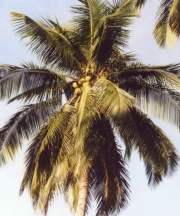Difference between revisions of "Coconut oil"
(username removed) |
|||
| Line 4: | Line 4: | ||
== Description == | == Description == | ||
| − | A colorless, nondrying oil or white, semisolid fat extracted from the dried meat of the [ | + | A colorless, nondrying oil or white, semisolid fat extracted from the dried meat of the [[coconut]] fruit (copra) obtained from the tropical palm ''Cocus nucifera''. Coconut oil contains the glycerides of [[lauric acid|lauric]] (45.4%), capric (8.4%), myristic (18.0%), [[palmitic acid|palmitic]] (10.5%), [[stearic acid|stearic]] (2.3%), and [[oleic acid|oleic]] (7.5%) acids. It is used commercially to make candy, cosmetics, soaps, emulsions, and leather cleaners. Coconut oil has also been used in gold tooling to adhere gold leaf prior to impressing a heated tool or die (Roberts and Etherington 1982). |
== Synonyms and Related Terms == | == Synonyms and Related Terms == | ||
Revision as of 10:52, 13 January 2014
Description
A colorless, nondrying oil or white, semisolid fat extracted from the dried meat of the Coconut fruit (copra) obtained from the tropical palm Cocus nucifera. Coconut oil contains the glycerides of lauric (45.4%), capric (8.4%), myristic (18.0%), palmitic (10.5%), stearic (2.3%), and oleic (7.5%) acids. It is used commercially to make candy, cosmetics, soaps, emulsions, and leather cleaners. Coconut oil has also been used in gold tooling to adhere gold leaf prior to impressing a heated tool or die (Roberts and Etherington 1982).
Synonyms and Related Terms
Cocus nucifera; aceite de coco (Esp.); olio di cocco (It)
Other Properties
Saponification value = 255-258. Iodine value = 8-9.5.
Soluble in ethanol, ether, chloroform, carbon disulfide. Insoluble in water.
| CAS | 8001-31-8 |
|---|---|
| Melting Point | 21-25 |
| Density | 0.92 |
| Refractive Index | 1.4485-1.4495 |
Hazards and Safety
Combustible.
Additional Information
M.Roberts, D.Etherington, Bookbinding and the Conservation of Books: a Dictionary of Descriptive Terminology, U.S. Government Printing Office, Washington, DC, 1982.
Authority
- G.S.Brady, Materials Handbook, McGraw-Hill Book Co., New York, 1971 Comment: p. 210
- Richard S. Lewis, Hawley's Condensed Chemical Dictionary, Van Nostrand Reinhold, New York, 10th ed., 1993
- Matt Roberts, Don Etherington, Bookbinding and the Conservation of Books: a Dictionary of Descriptive Terminology, U.S. Government Printing Office, Washington DC, 1982
- The Merck Index, Martha Windholz (ed.), Merck Research Labs, Rahway NJ, 10th edition, 1983 Comment: entry 2523
- Encyclopedia Britannica, http://www.britannica.com Comment: "coconut palm" Encyclopædia Britannica. [Accessed September 22, 2003].
- Random House, Webster's Encyclopedic Unabridged Dictionary of the English Language, Grammercy Book, New York, 1997
- The American Heritage Dictionary or Encarta, via Microsoft Bookshelf 98, Microsoft Corp., 1998
- CRC Handbook of Chemistry and Physics, Robert Weast (ed.), CRC Press, Boca Raton, Florida, v. 61, 1980 Comment: melting pt.=25.1C, density=0.924, ref. index=1.4463, iodine value = 10.4, saponification value=268
